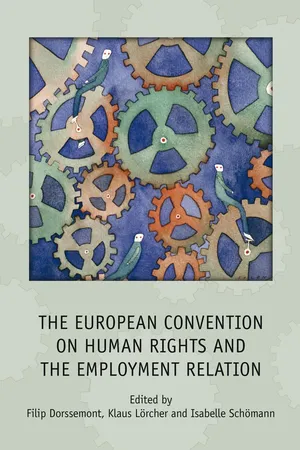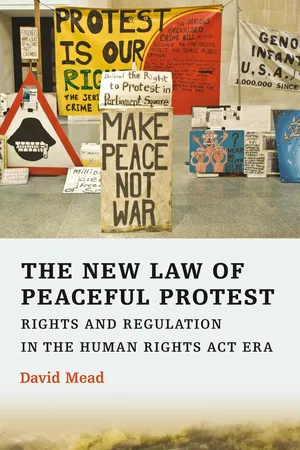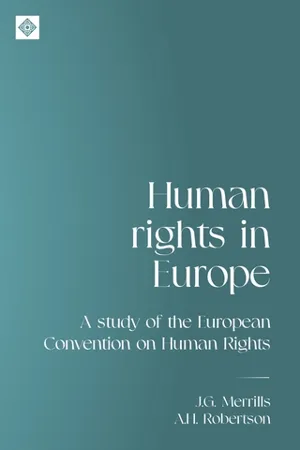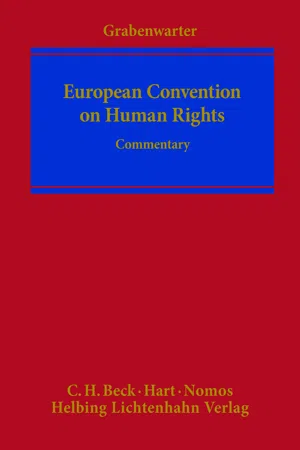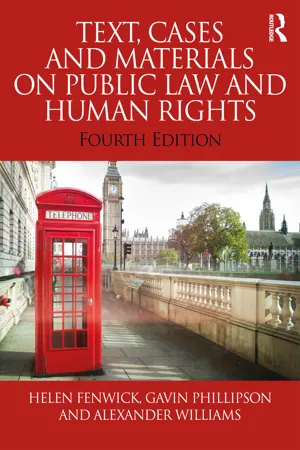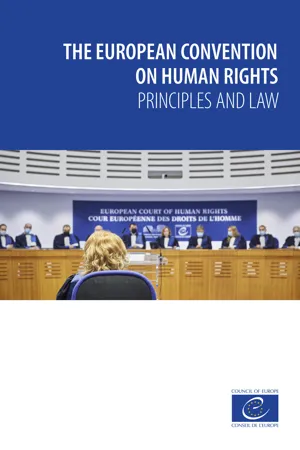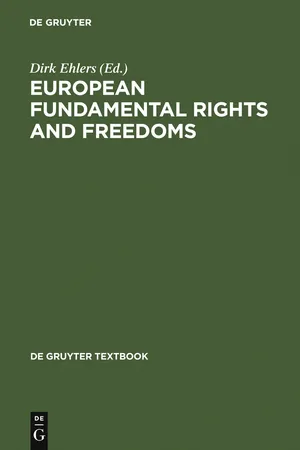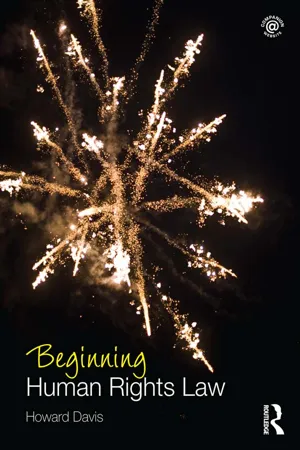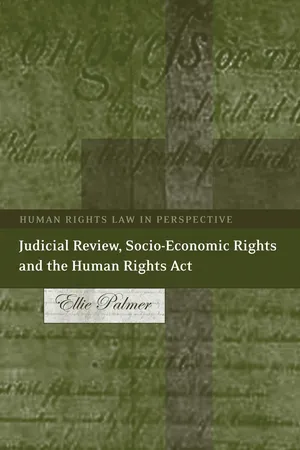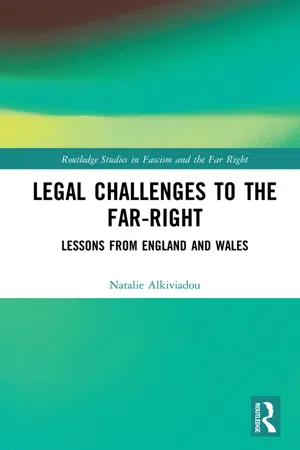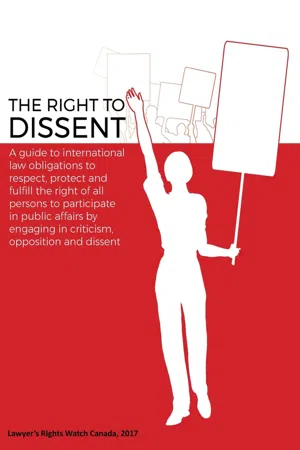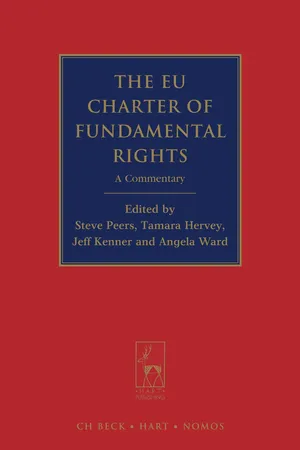Law
Article 11 echr
Article 11 of the European Convention on Human Rights (ECHR) protects the right to freedom of assembly and association. It guarantees the right to form and join trade unions, as well as the right to peaceful assembly. This article also includes the right to freedom of expression within the context of these activities.
Written by Perlego with AI-assistance
Related key terms
1 of 5
12 Key excerpts on "Article 11 echr"
- Filip Dorssemont, Klaus Lörcher, Isabelle Schömann(Authors)
- 2013(Publication Date)
- Hart Publishing(Publisher)
11 The Right to Form and Join Trade Unions Protected by Article 11 echr ISABELLE VAN HIEL 1 INTRODUCTION T HIS CONTRIBUTION DEALS with freedom of association in the narrow sense of the word, ie, the right to form and join trade unions, and the scope of its protection by the European Convention on Human Rights (ECHR). In the ECHR the right to form and join trade unions is not defined in an extensive way. Article 11 deals with freedom of assembly and freedom of association at the same time, while the right to form and join trade unions is construed as an aspect of the general freedom of association. The UDHR, 1 which inspired the ECHR, 2 contains separate provisions for the freedom of association (Article 20.2) and the right to form and join trade unions (Article 23.4). So do most of the social rights treaties, like the ICESC 3 (Article 8.1), the ESC 4 (Article 5) and, of course, ILO Conventions 87 5 and 98 6 . Only the ICCPR 7 (Article 22.1) and the EU Charter on Fundamental Rights 8 (Article 12.1) use the same terminology as the ECHR. The preparatory works of the Convention explain that the right to form trade unions was inserted in Article 11 ‘to bring this Article into conformity with the United Nations Universal Declaration’, 9 but as the UDHR mentions the right to form trade unions as a right distinct from the right to freedom of association in general, the relation between both rights remains ambiguous. 1 Universal Declaration of Human Rights of 10 December 1948. 2 D Gomein, D Harris and L Zwaak, Law and Practice of the European Convention on Human Rights and the European Social Charter (Strasbourg, Council of Europe Publishing, 1996) 301. 3 International Covenant on Economic, Social and Cultural Rights of 16 December 1966. 4 European Social Charter of 18 October 1961 and Revisited European Social Charter of 3 May 1996.- eBook - PDF
The New Law of Peaceful Protest
Rights and Regulation in the Human Rights Act Era
- David Mead(Author)
- 2010(Publication Date)
- Hart Publishing(Publisher)
1 The second comprises the bulk and analyses the constituent parts of Article 11(1) and the claw-backs of Article 11(2). It is not intended to be a detailed study of cases, case by case, but rather of general principles, issues and themes extracted from them. Summaries of facts, outcomes and reasoning are contained in Appendix III. The Court has long recognised that the right of peaceful assembly enshrined in Article 11 is a fundamental right in a democratic society and, like the right to freedom of expression, one of its foundations. Not only is democracy a fundamental feature of the European pub-lic order but the Convention was designed to promote and maintain the ideals and values of a democratic society. Democracy, the Court has stressed, is the only political model con-templated by the ECHR and the only one compatible with it. By virtue of the wording of 1 D Mead, ‘The right to peaceful protest under the European Convention on Human Rights—a content study of Strasbourg case law’ [2007] European Human Rights Law Review 345. Article 11(2), the only necessity capable of justifying an interference with the rights enshrined in that Article is one that may claim to spring from ‘democratic society’. 2 Some qualifications and caveats are needed at the outset. First, there is no right of peace-ful protest in the ECHR. It is used in this book as shorthand for the amalgam of the right of peaceful assembly under Article 11 and those aspects of freedom of political expression under Article 10 that can truly be said to be forms of protest. This chapter will in fact address a few Article 10 cases that relate to protest but in which there is no overlap with Article 11, either in terms of the factual scenario or the way the application is framed. - eBook - ePub
Human rights in Europe
A study of the European Convention on Human Rights
- J. G. Merrills, A. H. Robertson(Authors)
- 2022(Publication Date)
- Manchester University Press(Publisher)
The reference in the first paragraph to the right to form and join trade unions corresponds to Article 23(4) of the Universal Declaration. However Article 23(2), which provides that ‘No one may be compelled to belong to an association’, is a conspicuous omission from the Convention. In the Covenant on Civil and Political Rights the right of peaceful assembly and the right to freedom of association are separated, the first being guaranteed in Article 21 and the second in Article 22. Both Articles include a list of permissible restrictions similar, but not identical, to the list in the Convention. Restrictions on the right of association of members of the armed forces and the police are specifically mentioned, but not restrictions on the rights of persons employed in the administration. The Covenant contains an additional paragraph, Article 22(3), designed to preserve rights under the ILO Convention of 1948 on Freedom of Association and Protection of the Right to Organise, which is not found in the European Convention.Article 11 is not one of the more frequently invoked Articles of the Convention. Indeed, there was virtually no case law on this provision before 1970 and it has been rather slow to build up. It does, however, deal with freedoms which are bound up with the whole idea of democratic government. For if democracy is concerned with respecting individuals and giving attention to their claims, then permitting people to exhibit their concerns by demonstrating or forming interest groups are means to a democratic end. Moreover, the opportunity to act with like-minded people in pursuit of goals which are socially legitimate contributes to the self-realisation of the individual. Thus, as in the closely related cases of freedom of thought and freedom of expression, the freedoms protected by Article 11 are important in their own right.Freedom of assembly
This freedom, as the Commission pointed out in the Greek case, is ‘an essential part of the activities of political parties’52 and is consequently related to the obligation to hold free elections under Article 3 of Protocol No. 1. That provision, as we shall see in Chapter 8 , requires elections to be held ‘under conditions which will ensure the free expression of the people in the choice of the legislature’. Such conditions plainly require respect for freedom of assembly, so that election meetings can be held and freedom of association to permit the formation of political parties. In the Greek - eBook - PDF
European Convention on Human Rights
Commentary
- Christoph Grabenwarter(Author)
- 2014(Publication Date)
- Beck/Hart(Publisher)
28541/95, § 66; cf. Article 6 m.n. 11. 143 Cf. EComHR, 20/1/1987, Council of Civil Service Unions , DR 50, 228 (254): affirmed regarding personnel safeguarding the security of military and other State communication; unsanswered regarding teacher by ECtHR, 26/9/1995, Vogt v GER, No. 17851/91, § 68. 144 EComHR, 20/1/1987, Council of Civil Service Unions , DR 50, 228 (256). 145 Cf. EComHR, 20/1/1987, Council of Civil Service Unions , DR 50, 228 (256); Marauhn , in: Ehlers, § 4 m.c. 91; State employees may not be completely excluded from the scope of Article 11: ECtHR, 12/11/2008 (GC), Demir u. Baykara v TUR, No. 34503/97 § 107. 146 ECtHR, 26/9/1995, Vogt v GER, No. 17851/91 §§ 60, 66 et seq. 147 See Tomuschat , Freedom of Association, in: Macdonald/Matscher/Petzold, p. 493 (511); Marauhn , in: Ehlers, § 4 m.n. 90. 148 See for further detail Article 10 m.n. 62. IV. Justification 32, 33 Art. 11 315 V. Positive obligations 1. Freedom of assembly 34 The right to freedom of assembly is to be seen primarily as a right directed against State interferences. It obliges the States to refrain from unjustified interfer-ences. However, genuine, effective freedom of peaceful assembly cannot be reduced to a mere duty on the part of the State not to interfere: a purely negative conception would not be compatible with the object and purpose of Article 11. 149 Positive obligations arise under Article 11. 150 It sometimes requires positive measures to be taken, even in the sphere of relations between individuals, if need be. 151 It is important for the effective enjoyment of freedom of assembly that the applicable laws provide for reasonable time-limits within which the State authorities, when giving relevant decisions, should act. This is meant to prevent the loss of relevance or importance in a current social or political debate of an assembly. - Helen Fenwick, Gavin Phillipson, Alexander Williams(Authors)
- 2020(Publication Date)
- Routledge(Publisher)
181 It has been held in respect of the guarantees of other Articles that States must secure to individuals the rights and freedoms of the Convention by preventing or remedying any breach thereof. If no duty was placed on the authorities to provide such protection, then some assemblies could not take place.It will be argued in Chapter 19 that the freedom of assembly jurisprudence under Article 11 is cautious. In finding that applications are manifestly ill-founded, the Commission has been readily satisfied that decisions of the national authorities to adopt quite far reaching measures, including complete bans, in order to prevent disorder, are within their margin of appreciation.182 The Court has also found ‘the margin of appreciation extends in particular to the choice of the reasonable and appropriate means to be used by the authority to ensure that lawful manifestations can take place peacefully’.1833. The term ‘association’ need not be assigned its national meaning. Even if a group such as a trade union is not an ‘association’ according to the definition of national law, it may fall within Article 11. The term connotes a voluntary association, not a professional organisation established by the Government. It should be noted that it is only with respect to trade unions that the right to form an association is expressly mentioned, albeit non-exhaustively. Such a right in respect of other types of association is clearly implicit—a necessary part of freedom of association. The key rights protected by Article 11 include the basic right to form associations184 and the right to autonomy of an association.185 An association itself can exercise Convention rights, including freedom of expression (Socialist Party and Others v Turkey).1864. The earlier Strasbourg jurisprudence tended to be protective of State interests,187 but the more recent ‘association’ jurisprudence of the Court is more interventionist. In Socialist Party and Others v Turkey,188 the Court allowed only a very narrow margin of appreciation in finding that the dissolution of the Socialist Party of Turkey had breached Article 11. The Court linked the three freedoms of expression, association and assembly together in finding that democracy demands that diverse political programmes should be debated, ‘even those that call into question the way a State is currently organised’. The Court did not accept that the message of the group that a federal system should be put in place which would ensure that Kurds would be put on an equal footing with Turkish citizens generally, amounted to incitement to violence. The dissolution of the party was thus disproportionate to the aim in view—the preservation of national security. This stance is in accordance with the Convention jurisprudence, which has quite consistently recognised the need to protect the interests of minority and excluded groups.189- Carla M. Buckley, Krešimir Kamber, Pamela McCormick, David J. Harris(Authors)
- 2022(Publication Date)
- Council of Europe(Publisher)
149 the state’s decision to dissolve a non-governmental organisation for engaging in religious activity violated Article 11 (2) because there was no definition of the term in the legislation or by the domestic courts or authorities, thereby making it impossible for the association to foresee what constituted “religious activity” in order to carry out their activities in accordance with law.IV. FREEDOM TO FORM AND JOIN TRADE UNIONSThe freedom to form and join trade unions is not a separate right but a part of freedom of association. Consequently, the elements of freedom of association mentioned above, such as regarding the formation and recognition of associations, apply to trade unions. The right to freedom to form and join trade unions in Article 11 is complemented by similar guarantees in the European Social Charter (Article 5) and the International Labour Organization Conventions.150 The Court takes into account the guarantees in those instruments as interpreted by their implementing bodies and generally interprets the Convention consistently with them.151The only indication of the meaning of “trade union” is to be found in Article 11 (1): that they are organisations in the field of employment that have as their purpose the protection of their members’ interests.152 Everyone in employment, whether under a contract of employment or self-employed, has the right to form and join a trade union with only two possible exceptions that have arisen: priests153 and self-employed farmers.154 Members of the armed forces, the police and the administration of the state may have restrictions placed on their right to form and join trade unions but these must not take away the essence of the right.155Article 11 imposes negative and positive obligations on the state.156 Trade unions and individuals may claim to be victims of a breach of their rights under Article 11. The negative obligation not to interfere with individual and trade union freedom of association in Article 11 (1) is qualified by Article 11 (2), which, in its first sentence, permits restrictions on the grounds specified and, in its second sentence, permits restrictions on the exercise of Article 11 rights by members of the armed forces, the police or the administration of the state. As to positive obligations, these are to secure the rights of individuals and trade unions against employers, and to protect the individual against abuse by trade unions. As with Articles 8 to 10, whether it is the negative or positive obligation the “criteria applied do not differ in substance”; in both contexts the question is whether a “fair balance” has been “struck between the competing interests of the individual and the community as a whole”.157 In deciding whether a “fair balance” has been struck, “in view of the sensitive character of the social and political issues involved in achieving a proper balance between the respective interests of labour and management and given the wide degree of divergence between domestic systems in this field”, the states “enjoy a wide margin of appreciation as to how the freedom of trade unions to protect the occupational interests of their members may be secured”.158 However, in cases concerning limitations on the right of individuals to form or join a trade union, there will be a narrower margin of appreciation “as these run counter to the freedom of choice of the individual inherent in Article 11”.159 There is also a narrower margin of appreciation where a legislative restriction strikes at the core of trade union activity and more is required to justify the proportionality of the interference, in the general interest, with the exercise of trade union activity.160- eBook - PDF
- Dirk Ehlers, Ulrich Becker, Et al., Dirk Ehlers(Authors)
- 2011(Publication Date)
- De Gruyter(Publisher)
4 I. The Protection of Liberty (Article 5 ECHR) Lead by the structure of regulation used in the Basic Law, the content of Article 5 of the ECHR can be divided into three parts. Article 5(1)(i) of the ECHR contains the general guarantee of individual liberty (comparable to Article 2(2)(ii) of the Basic Law), the second sentence of paragraph 1 includes the conditions governing the legality of certain acts of interference (comparable to Article 104(1) of the Basic Law), while finally Ar-ticle 5(2) to (5) of the ECHR comprises particular procedural guarantees related to depri-vations of liberty (comparable to Article 104(2) and (3) of the Basic Law). In Article II-66, the Treaty establishing a Constitution for Europe (Draft Constitution – DC) recogni ses the right to liberty and security. 5 151 1 2 3 1 Current judgements of the European Court of Human Rights can be retrieved from the internet under http://www.echr.coe.int/. 2 For example cf Grabenwarter in: Cremer (ed) Tradition und Weltoffenheit des Rechts (Berlin 2002) pp 1129–1131. 3 BVerfG (1987) 74 BVerfGE 358, 370; (1991) 82 BVerfGE 106, 115. 4 Grabenwarter Verfahrensgarantien in der Verwaltungsgerichtsbarkeit (Vienna 1997) pp 696 ff. 5 Concerning the extent of guarantee cf Grabenwarter [2001] DVBl 1, 4. 1. The Right to Liberty and Security The scope of protection of Article 5 of the ECHR comprises – apart from the prohibition of arbitrary arrest and deprivation of liberty (subsection 1) 6 – the guarantee of a judicial control of deprivation of liberty. Article 5 of the ECHR is also applicable to short-term deprivation of liberty. 7 When judging whether a deprivation of liberty in the sense of Article 5 of the ECHR exists, the concrete situation of the individuals affected must be taken into account. 8 Although the terms “liberty and security” are listed separately in Article 5(1) of the ECHR, the right to security has only gained minor significance of its own. - eBook - ePub
- Howard Davis(Author)
- 2014(Publication Date)
- Routledge(Publisher)
It includes not just speech but all other forms of expression such as writing, musical composition, singing, photography, painting etc. The sloganising and other forms of display that may be part of a political demonstration can also engage Article 10(1), and so restrictions on demonstrations can be dealt with under Article 10 as much as under Article 11, depending on the context. • The purpose of the expression is normally irrelevant and includes political, commercial and artistic expression etc. • As well as the right to ‘hold opinions’ and ‘impart’ ideas and information, the first paragraph of Article 10 protects the right to ‘receive’ ideas and information. This is potentially very important since most people do not have much opportunity to speak in a public forum but do have a strong interest, as citizens, in being well-informed on public matters. However, this provision, by itself, is of limited use since the ECtHR has said that it cannot generally be used against an unwilling provider (Leander v Sweden (1987) 9 EHRR 433) (unless needed to protect some other right, such as the proper respect for private life). There is evidence that the ECtHR is changing its position and now looks more favourably on the rights of ‘watchdogs’ (e.g. the media or some NGOs) to compel the disclosure of public information (Tarsasaga a Szabadsagjogokert v Hungary (2011) 53 EHRR 3). Article 11 guarantees ‘freedom of peaceful assembly’ and ‘freedom of association’. • ‘Assembly’ refers to meetings, marches, demonstrations etc and ‘association’ to forming, joining and participating in clubs, societies, political parties, churches etc. • The definition of ‘peaceful’ assembly can be problematic - Ellie Palmer(Author)
- 2007(Publication Date)
- Hart Publishing(Publisher)
However, even when the Court has recognised that there is a sufficient link, it has been slow to find breaches of Article 14 in cases where violations of the subsidiary right have not been established. Moreover, in cases where there has been violation of the sub-sidiary right (for example, in the recent case of Connors 181 ), the court has sub-sequently found it unnecessary to consider whether there has been violation of Article 14. The Protection of Socio-economic Rights in the ECHR 81 178 Which states in Art 1 that (1) ‘The enjoyment of any right set forth by law shall be secured without discrimination on any ground such as sex, race, colour, language, religion, political or other opinion, national or social origin, association with a national minority, property, birth or other sta-tus’ and (2) ‘No one shall be discriminated against by any public authority on any ground such as those mentioned in paragraph 1.’ 179 Petrovic v Austria (1998) 4 BCHR232, paras 22 and 28. 180 (1996) 23 EHRR 365. 181 Note 156 above; discussed in section III.D above. F. Article 6: Due Process in Public Law Challenges The fair trial clause in Article 6 ECHR has provided an important avenue for the indirect protection of socio-economic rights in ECHR jurisprudence. 182 As we have seen, the right to free legal assistance as a ‘social’ dimension of the right to a fair trial was emphasised by the ECtHR in Airey . 183 More recently, the fun-damental right in Article 6 has been extended to encompass a right of access to courts in disputes over discretionary socio-economic entitlements in public administrative law. Article 6 covers all proceedings, whether between two private individuals or between an individual and a state, the result of which is ‘decisive’ for civil rights and obligations. 184 However, a remote connection between the subject matter of the dispute and the concept of civil rights will not be sufficient to bring Article 6 into play.- eBook - ePub
Legal Challenges to the Far-Right
Lessons from England and Wales
- Natalie Alkiviadou(Author)
- 2019(Publication Date)
- Routledge(Publisher)
Human rights and fundamental freedomsIn view of the fact that the issues set out within this book are assessed through a human rights lens, this chapter looks at the human rights framework of the country as this will facilitate the subsequent discussion. To this end, this chapter pinpoints how the key freedoms of non-discrimination, expression, assembly and association are established in domestic law. By conceptualising and contextualising human rights protection in England and Wales, the reader will be better able to follow the philosophy behind, for example, restrictions to rights and freedoms if these are sought for far-right purposes.Freedom of expression
Even before the incorporation of the Human Rights Act 1998 (HRA), the freedom of expression was anyhow constructed and protected in the common law framework.1 However, the fact remains that there was no statutory protection of the right to the freedom of expression up until the passing of the HRA in 2000. That was the first time that the meaning of the freedom of expression and a reference to the limitations that can be legitimately imposed thereto, as so provided by Article 10 of the European Convention on Human Rights (ECHR), were incorporated into national legislation. In fact, referring to two cases, namely R v Secretary of State for the Home Department2 and Reynolds v Times Newspapers Ltd,3 one commentator noted that an embracement of the freedom of expression by the courts can be discerned during the time when the HRA was being passed.4 For example, in the former case, which dealt with prisoners’ freedom of expression, the House of Lords deemed this freedom to be ‘as strongly protected in the common law as it is under the Convention’.5 In the latter case on defamation and libel, Lord Steyn, in citing the 1972 case of Broome v Cassell & Co. Ltd,6 noted that there is a ‘constitutional right to freedom of expression in England’.7 - eBook - ePub
The Right to Dissent
A guide to international law obligations
- Lois M. Leslie(Author)
- 2017(Publication Date)
- Lawyers' Rights Watch Canada(Publisher)
360In relation to the exercise of freedom of association, authorities should not be entitled to impose conditions on any decisions and activities of an association; reverse the election of board members; require the presence of a government representative at a board meeting or request that an internal decision be withdrawn; request associations to submit annual reports in advance; or enter an association’s premises without advance notice.361 Procedures to provide for the examination by independent bodies of an association’s records to ensure transparency and accountability “should not be arbitrary and must respect the principle of non-discrimination and the right to privacy as it would otherwise put the independence of associations and the safety of their members at risk”.362The ACHPR found that the right to freedom of association had been violated when the Government of Nigeria provided the Nigerian Bar Association with a new governing body and stipulated that 97 of the 128 members constituting this body would be appointed by the government.363Similarly, the collection and processing of personal information by authorities in the proper management of assemblies must comply with protections against arbitrary or unlawful interference with privacy.364 Recording peaceful assembly participants in a context and manner that intimidates or harasses them is an impermissible interference with rights, including privacy, freedom of assembly, association and expression.365Right to life, liberty and security of the personEveryone has the right to life, liberty and security of the person. These fundamental human rights are reflected in UDHR - eBook - PDF
The EU Charter of Fundamental Rights
A Commentary
- Steve Peers, Tamara Hervey, Jeff Kenner, Angela Ward, Steve Peers, Tamara Hervey, Jeff Kenner, Angela Ward(Authors)
- 2014(Publication Date)
- Hart/Beck(Publisher)
51 ICCPR, Art 14(3)(a); ECHR, Art 6(3)(c). 52 ICCPR, Art 14(3)(e); ECHR, Art 6(3)(d). 53 ICCPR, Art 14(3)(g). 54 ICCPR, Art 14(3)(a); ECHR, Art 6(3)(a). 55 ICCPR, Art 14(5), Protocol No 7 to the Convention on the Protection of Human Rights and Fundamental Freedoms, 22 November 1984, 1525 UNTS 195, ETS No 117, Art 2. 56 ICCPR, Art 14(1). See also, ECHR, Art 6(1). 57 Comm No 532/19993 ( Thomas v Jamaica), Views of 3 Nov 1997, II Rep of the Human Rights Committee, GAOR, 53rd Sess, Supp No 40, UN Doc A/53/40, 1 (1998). For a commentary on legal aid under the EU Charter, see section D.IX. 58 Airey v Ireland (1979) ECHR Series A no 32, 11. 59 Advisory Opinion OC-11/90, Exhaustion of Remedies (1990) 11 Inter-AmCtHR Series A. On legal aid under the law of the ECHR and Art 47 of the EU Charter, see section D.IX. 47.41 47.42 Part I – Commentary on the Articles of the EU Charter 1210 Dinah Shelton in the context of the Convention, given that the limitations on the scope of Article 6 do not apply to the Charter (see section D.II below). Article 47 is relevant to both the EU institutions and the Member States, the latter having the main role as regards the implementation and enforcement of EU law. This means that much of the case law concerning Article 47 (including the pre-Charter case law on the equivalent general principles of EU law) concerns the impact of the rights set out in Article 47 upon access to national courts and the remedies available before such courts. II. Scope of Application As made clear in the explanations to Article 47 of the Charter, that provision is wider in scope than the parallel provisions of the ECHR (Art 13 ECHR, as regards Art 47(1), and Art 6(1) ECHR, as regards Art 47(2)).
Index pages curate the most relevant extracts from our library of academic textbooks. They’ve been created using an in-house natural language model (NLM), each adding context and meaning to key research topics.
